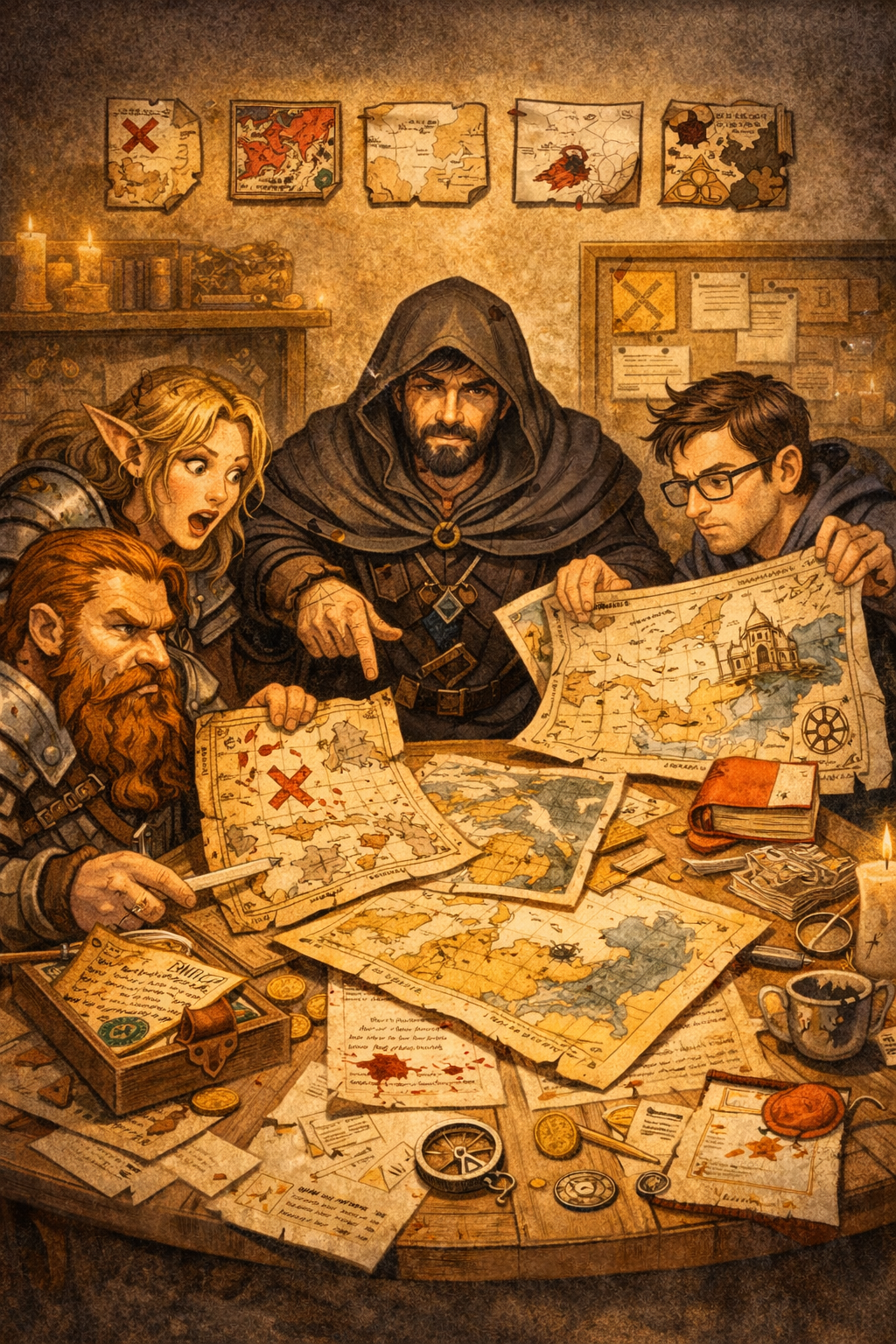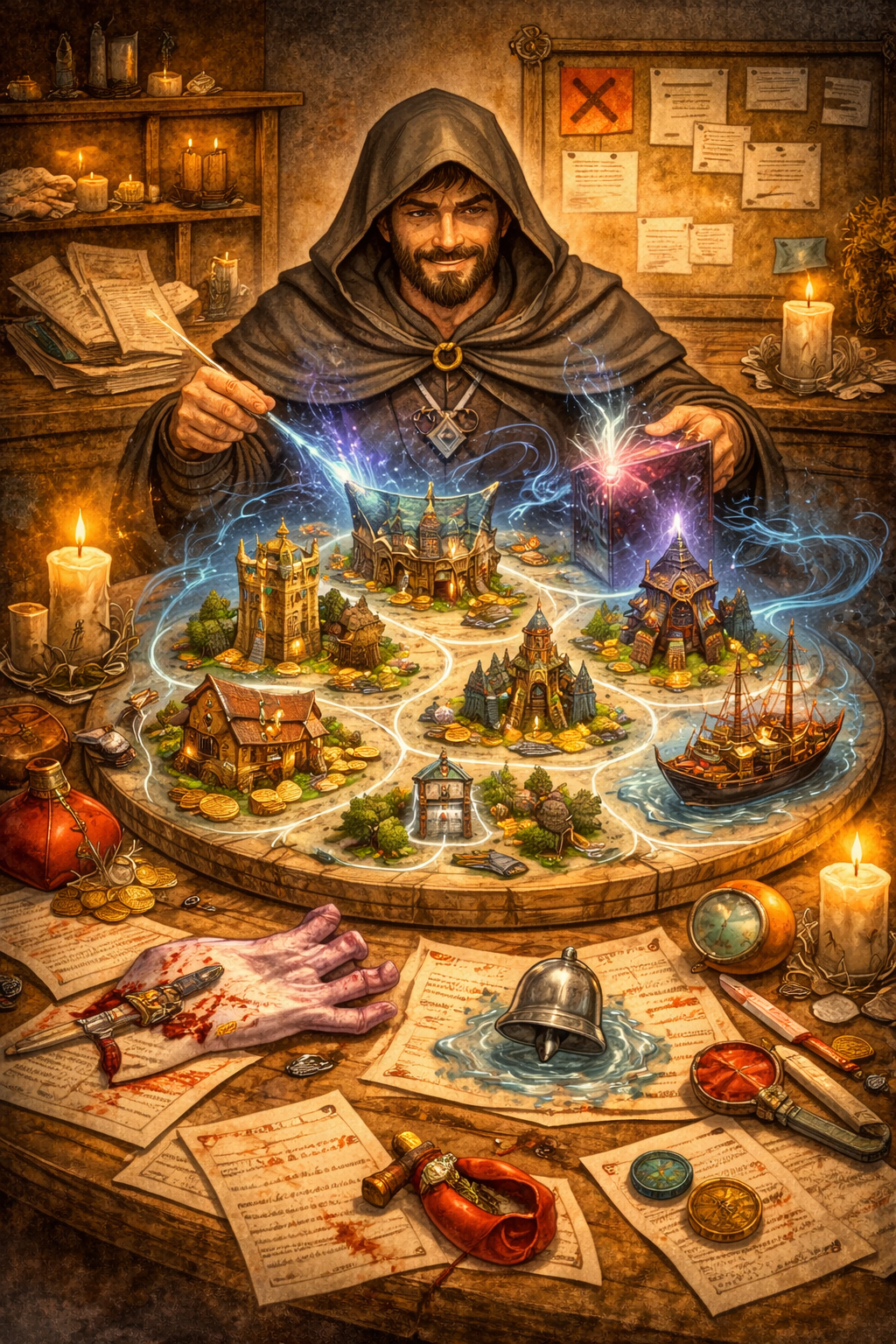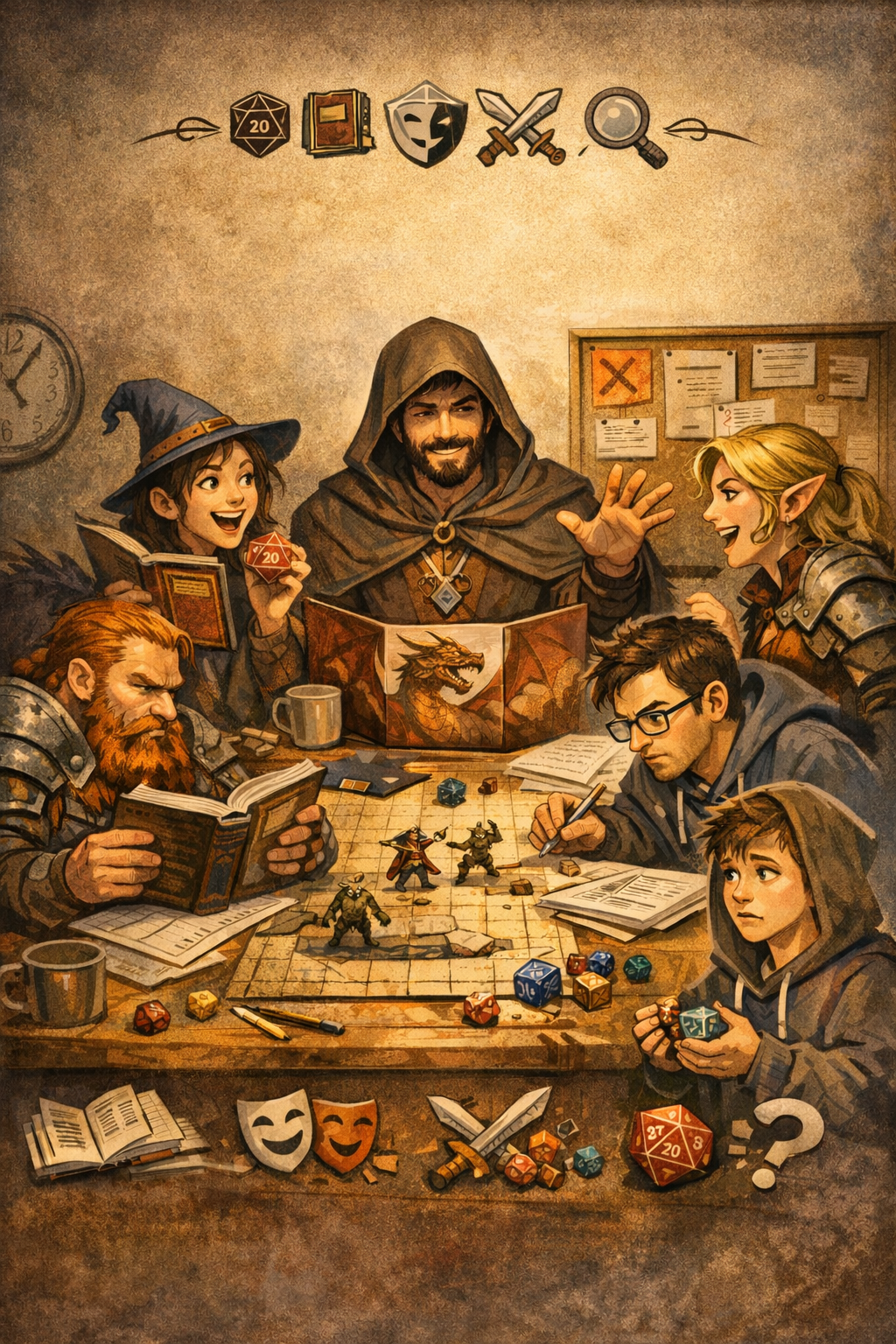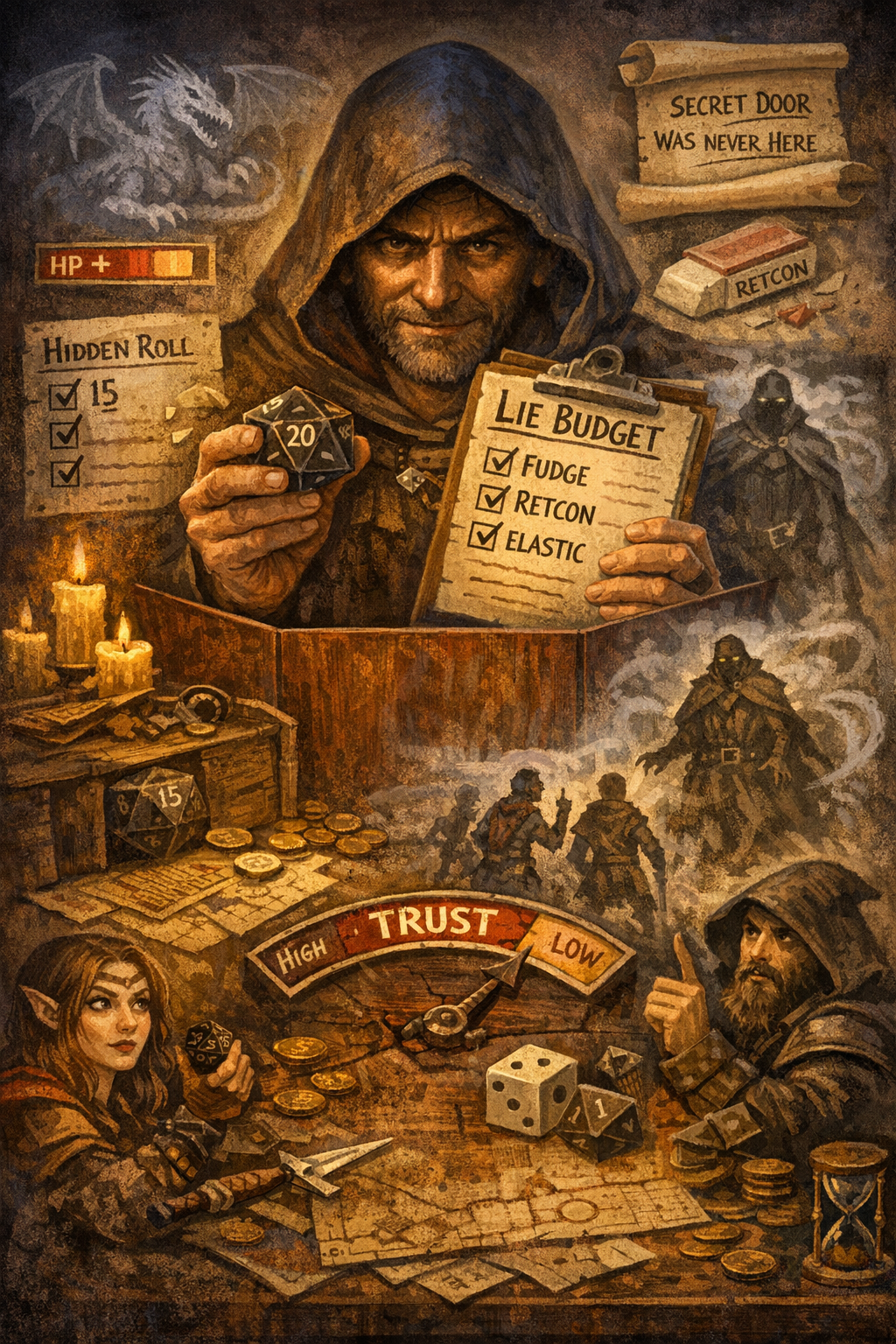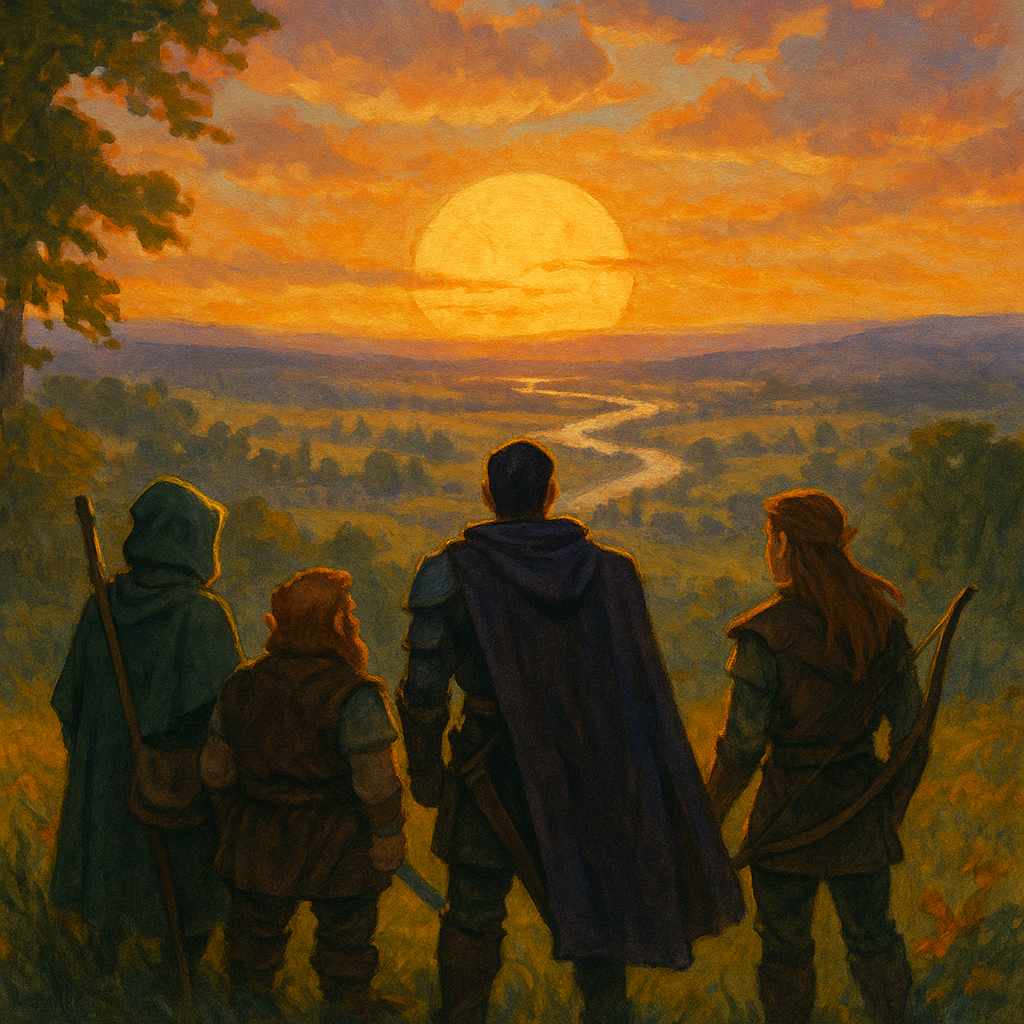The Ministry of the Dungeon: Pastoral DMing
Okay, just hear me out...
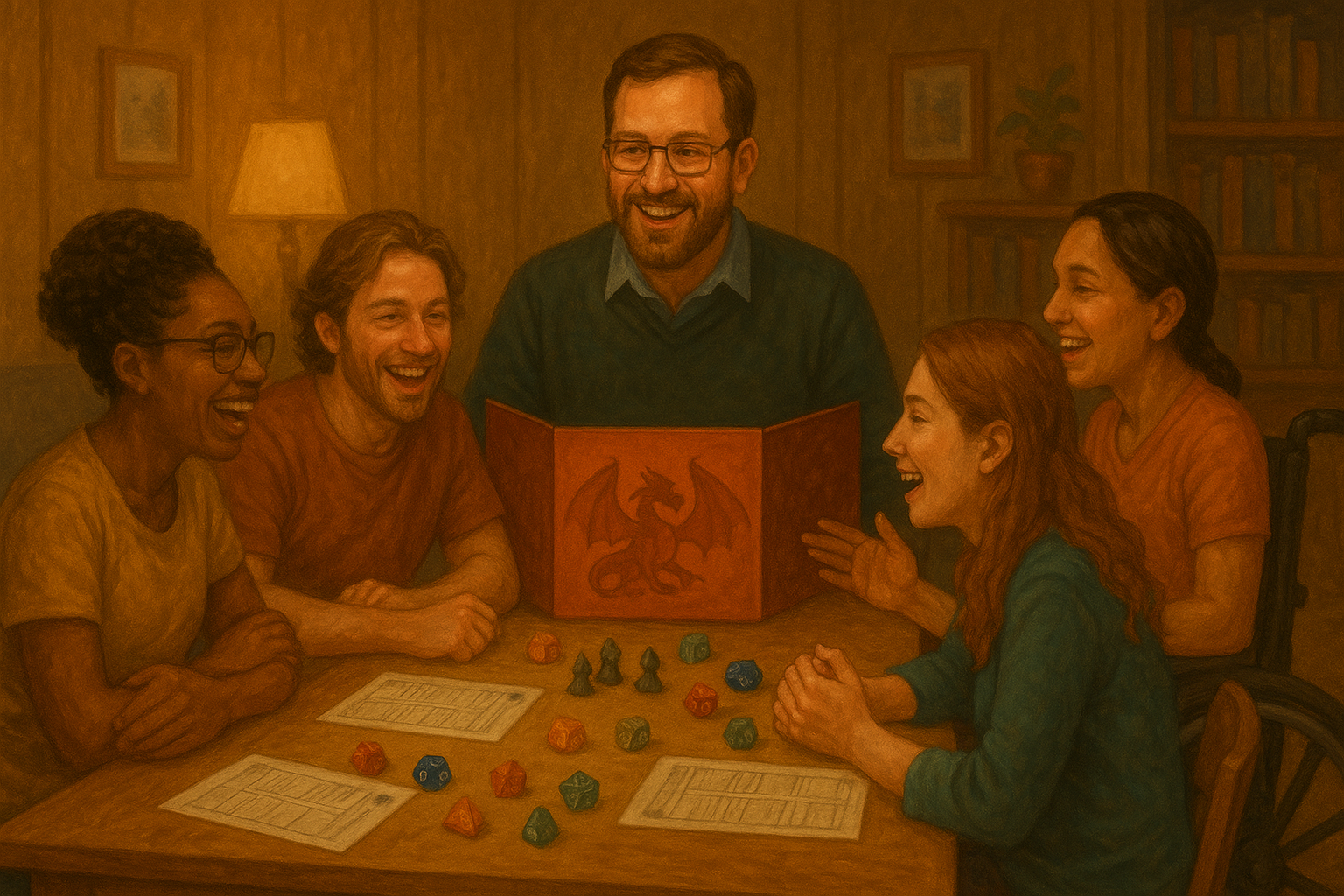
Dear Readers,
Let me begin with this: if you’ve ever sat at a table: nervous, uncertain, a little unsure if you belong, then you know the sacred weight of being welcomed. Maybe you were new to the game. Maybe you were new to people altogether. Maybe, just maybe, you were carrying something heavy: grief, loneliness, shame, fear. And someone smiled across the table and said, “Glad you’re here. Let’s play.”
There’s a kind of grace in that moment. A subtle, radiant kindness. The kind of kindness I’ve come to recognize as the real heart of faith, not dogma, not judgment, but something warmer and wilder. Something like love that cannot be earned and yet is offered freely. And I believe, in the quiet alchemy of dice and imagination, Dungeon Masters and Game Masters can practice something sacred: something I’ve come to call Pastoral DMing.
Now, I know “pastoral” is a loaded word for some. For many, it conjures images of pulpits and rules, expectations and exclusion. But that’s not what I mean. Not today.
When I say “pastoral,” I mean a way of leading rooted in compassion, empathy, and radical inclusivity. I mean the kind of DMing that sees people first. That invites the outcast, listens to the misfit, and makes a seat for the one who was never picked first. I mean the kind of storytelling that heals, holds, and honors.
I want to share with you today what it means to be a Pastoral Dungeon Master, how this lens has transformed the way I run my games, and why I believe the tabletop can be a ministry, not of religion, but of unconditional belonging.
And I want to highlight the work of some beautiful folks doing this work, too, like Rory, the Dungeon Master Pastor from roll4joy.org, and the incredible Holy Rollers retreat he hosts (read through to the end for a special promo code!), where faith and fantasy intertwine in ways that lift people up rather than cast them out.
So pull up a chair, dear Reader. Let’s talk about the ministry of the dungeon.
Chapter One: The Table as Sacred Space
We often talk about the "magic of the table," that sense of transformation when dice hit wood and the real world fades away. But have you ever considered that your table might be sacred—not because of the game, but because of the people gathered around it?
In many spiritual traditions, sacred spaces are places where we are free to be vulnerable. They are places where healing can happen, where stories become vehicles for understanding, and where presence. true presence, is a gift.
A pastoral DM understands this. They don’t need a seminary degree or a title. They need only a heart open to seeing the table as more than a game. They see it as:
- A refuge for the weary
- A spotlight for the unseen
- A balm for the wounded
- A home for the outcast
Faith, at its best, teaches us this: love your neighbor. Feed the hungry. Shelter the stranger. The gaming table becomes sacred when we do these things, not with bread or sermons, but with shared stories, deep listening, and the relentless act of including people who were told they don’t belong.
And if that’s not ministry, I don’t know what is.
Chapter Two: Everyone at the Table Matters
I’ve said it before and I’ll say it again: the greatest monsters in gaming aren’t dragons or liches: they’re shame, exclusion, and silence.
One of the first tasks of Pastoral DMing is to make sure everyone at the table knows: You matter. You belong. You are safe here.
This isn’t about coddling. It’s about honoring. It’s about learning how to:
- Create safety tools like X-cards and lines & veils without making it awkward
- Check in when someone’s going quiet
- Make space for players who are neurodivergent, introverted, or navigating social anxiety
- Validate players who bring their whole selves to the table, including their queerness, their grief, their trauma, their joy
One of the most beautiful things Rory talks about on roll4joy.org is the idea that "at the table, there’s room for all of us." Not just the bold, not just the charismatic, not just the min-maxers. All of us.
His work with the Holy Rollers retreat exemplifies this. The retreat isn’t just about learning how to DM better or even to just play, it’s about learning how to love better. It’s about helping people see that their faith and their nerdiness aren’t at odds. It’s about modeling what it looks like to live out a theology of joy, inclusion, and creativity.
And honestly? That’s the kind of DM I want to be.
Chapter Three: Love Without a Script
One of the first lies many of us were taught, about faith, about life, about ourselves is this:
"You’re only worthy if you follow the script."
Pastoral DMing breaks that lie.
It says, You are worthy whether your character is a pacifist or a rage machine. You are worthy whether you understand the rules or not. You are worthy even if you mess up, show up late, or cry during a combat round.
The ministry of the dungeon isn’t about perfection. It’s about presence.
A pastoral DM doesn’t run games to show off. They run games to draw near.
They don’t railroad players, they walk beside them.
They don’t punish mistakes, they turn them into plot hooks.
They don’t gatekeep, they shepherd.
And most of all? They don’t script the kind of love that only comes through being available to the real human beings who sit down at the table.
I’ve seen tables where a single session became a lifeline. A trans player hearing their chosen name used with reverence. A grieving parent finding catharsis in the resurrection of an NPC. A lonely teen discovering that laughter with people feels different than laughter alone.
None of that came from the monster manual. It came from people choosing to love without a script.
Chapter Four: Storytelling as Sacrament
Some people break bread. Some people light candles. Some people sing hymns.
We roll initiative.
That might sound cheeky, but I mean it sincerely. There is a liturgy in our games. A rhythm of story and silence, suspense and revelation. When you run games as a pastoral act, every beat becomes more than narrative, it becomes communion.
Consider:
- When we let players confront their shadows, we invite them into confession
- When we let characters be redeemed, we embody forgiveness
- When we allow unexpected alliances, we model reconciliation
- When we center marginalized stories, we practice justice
The table becomes a place where we can explore the deepest questions of the human spirit: through dragons, yes, but also through choices. Through characters who are broken, beloved, and becoming.
Just like us.
Chapter Five: The Inclusive Table Is a Powerful Table
Let me say this loudly and clearly: inclusive gaming is better gaming. Full stop.
When we make room for people of all races, gender identities, sexual orientations, neurotypes, disabilities, and backgrounds, we don’t dilute the game, we enrich it.
The stories get more vibrant.
The jokes get funnier.
The perspectives get deeper.
The table gets stronger.
And it’s our job as DMs, as community leaders, as humans to make that space happen intentionally.
I’m not perfect at it. You won’t be either. But perfection was never the point.
Love is the point.
One of my favorite things Rory shared from the Holy Rollers retreat was this idea that “Christ wasn’t interested in purity tests. He was interested in proximity.” He sat with the marginalized. He walked with the shamed. He flipped tables for the oppressed.
If that’s not a call to inclusive table-building, then nothing is.
You don’t have to believe what I believe. But if you believe that people matter, that stories have power, and that everyone deserves a place to belong, then you already believe enough.
Chapter Six: Ministering Through Conflict
Pastoral DMing doesn’t mean avoiding conflict. In fact, it often means stepping into it—with tenderness, courage, and clarity.
Sometimes conflict arises at the table:
- A player says something insensitive or harmful
- A storyline brushes against a trauma
- Someone feels unseen or excluded
As DMs, we’re not therapists. But we are guides. And part of the ministry is learning to navigate those moments with humility.
Here are some tools I’ve used:
- The One-on-One: Pull someone aside privately and gently explore what happened. Use “I” statements. Offer grace. Ask questions.
- The Group Check-In: Don’t let things fester. After a tough moment, take five minutes to check in. “How’s everyone feeling about that?”
- The Do-Over: Normalize retconning or reworking scenes if they caused harm.
- The Apology Model: If you mess up, apologize. Name it. Own it. Model repair.
And most importantly? Listen. Listen not just to words, but to tone, posture, energy.
Listening is love in action.
Chapter Seven: Creating Characters That Heal
One of the great joys of DMing is helping players create characters. And one of the great ministries of DMing is helping players create characters that heal.
What do I mean by that?
Sometimes players build:
- A character who is confident because they’re not
- A character who is nurturing because they never received it
- A character who is angry because they’re tired of being polite
- A character who is magical because they were told they never could be
These characters aren’t just fantasy. They’re therapy. They’re mirrors and doorways and prayers.
As a pastoral DM, you have the honor of holding those stories with care.
Ask your players:
- “What does this character need to learn?”
- “What’s something you want this character to experience that you haven’t?”
- “Is there a part of you in this character that you want to explore?”
You don’t need to psychoanalyze. You just need to hold space.
Sometimes that means building encounters that let a timid player be brave.
Sometimes it means letting the “bad guy” be forgiven.
Sometimes it means letting someone win, not the game, but their own story.
Chapter Eight: Modeling the Kind of God We Wish We Knew
For those of us who’ve been hurt by religion, Pastoral DMing becomes more than a role, it becomes a kind of reclamation.
We get to model:
- A deity who doesn’t smite, but guides
- A divine force that doesn’t demand worship, but delights in co-creation
- A sacred presence that lets the players choose, even when they choose wrong
I know not everyone reading this believes in God. That’s okay.
But if you’ve ever longed for a love that doesn’t flinch, maybe you’ve already found it at your table.
Maybe the way you care for your players, the way you honor their weirdness, the way you write NPCs who are complex and broken and beautiful; maybe that is a kind of divine.
I think God shows up in dice rolls, sometimes.
And I think the ministry of the dungeon is sometimes more honest than the ministry of the church.
Because here, we don’t pretend we’re perfect. We play as we are.
And we love anyway.
Chapter Nine: You Don’t Have to Have It All Together
If you’re reading this thinking, “This is beautiful, but I’m barely keeping my head above water,” let me say this plainly:
You do not have to have it all together to lead a healing table.
You don’t need to be a saint.
You don’t need to be a great therapist.
You don’t need to be the best writer or the funniest GM.
You just need to show up:
With empathy.
With a willingness to listen.
With an openness to let the game do its holy work.
And when you get it wrong (and you will) just come back. Keep loving. Keep trying.
That is the ministry.
Chapter Ten: Let’s Keep Rolling for Joy
I want to end where I began: with love.
Love that isn’t earned.
Love that doesn’t exclude.
Love that shows up in messy rooms with clicky dice and too many snacks and four-hour tangents about owlbear mating rituals.
That is the love I believe in.
And if you’re looking for a place to start, or to rest, I invite you to check out the community at roll4joy.org. Rory’s heart for storytelling, for care, for people who’ve been burned and still long to belong, it’s a ministry in every sense of the word.
The Holy Rollers retreat he runs is proof that this isn’t just theory. It’s real. It’s happening. It’s possible.
So maybe your table becomes that, too.
Maybe your next session is more than just monsters and maps.
Maybe it's ministry.
Maybe it’s a miracle.
Maybe it's just enough.
And maybe—just maybe—that’s the most sacred thing of all.
May your stories be brave, your tables be kind, and your love be loud.
Until next time, Dear Readers...
P.S. - For those who are interested, the Holy Rollers Retreat is from 20-23 October this year, and is open to all ministers, ministry leaders, and "Adventurers of Faith." I'm even one of the Dungeon Masters this year! Simply go to
https://roll4joy.org/holy-rollers-retreat/, scroll down and click on "Register Here." Use the promo code DAILYDM for a discount! And you need to hurry as space is limited. Hope to see you there!
















